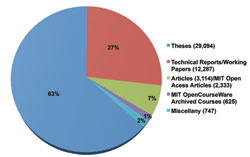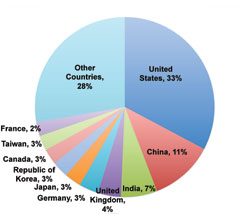
| Vol.
XXIII No.
4 March / April 2011 |
| contents |
| Printable Version |
About DSpace@MIT
DSpace@MIT is an innovation of the MIT Libraries that was launched in 2002 to address the growing challenge of collecting, preserving, and distributing MIT’s scholarly content in various digital formats. The digital repository was created in the spirit of the Institute’s mission – to disseminate and preserve the scholarly work of MIT’s great minds so that it may be openly available and used to advance knowledge around the world.

(click on image to enlarge)
Currently DSpace@MIT houses over 45,000 items from 62 depositing “communities” representing MIT faculty, researchers, departments, labs, and centers. Collections in DSpace@MIT continue to expand as new communities and important works are added – the growth of collections such as the MIT Open Access Articles collection, containing the scholarly articles that MIT faculty have chosen to make openly available through the Faculty Open Access Policy, is a recent example.
In addition to scholarly articles, the repository includes a wide array of other digital material such as working papers, technical reports, preprints, images, and more that are vetted by each MIT community and submitted to the repository.
The MIT Libraries also maintains collections within DSpace@MIT, the largest of which is a collection of over 29,000 MIT theses and dissertations dating as far back as the mid-1800s. Since 2004, all new Masters and PhD theses are automatically submitted to the repository in digital format; theses completed prior to 2004 are added as they are digitized by the Libraries.
Since its creation, DSpace@MIT has been looked to as a model for digital repositories. It currently ranks twelfth in the world in a ranking of over 1,100 institutional Web repositories by the Cybermetrics Lab, a research group within the Consejo Superior de Investigaciones Científicas (CSIC). MIT’s repository is ranked alongside other distinguished institutions in the top 20, such as CERN and the Smithsonian/NASA Astrophysics Data System.
The original DSpace software platform, on which DSpace@MIT operates, was developed jointly by the MIT Libraries and Hewlett-Packard (HP). Since its launch, the open source software has been widely adopted by numerous organizations facing similar digital archiving challenges. Today, the software that began as an idea at MIT, has been adopted by over 1,000 organizations worldwide. It continues to be the software of choice for academic, non-profit, government, and commercial organizations building digital open repositories.
Usage data show that the collections in DSpace@MIT are accessed from nearly every country in the world at an average rate of over 30,000 downloads a day. In 2010 alone there were 11.2 million total downloads. Users are finding items in DSpace@MIT in a number of ways, mostly by Web search through engines like Google and Google Scholar, but also through externally hosted portals, through the DSpace@MIT user interface itself, and from published literature references via persistent identifiers.
DSpace@MIT is a service of the MIT Libraries for the faculty and research community at MIT and is open to new contributors. The Libraries can provide assistance in establishing new collections in DSpace@MIT, as well as provide consultation and production services for metadata creation and digitization of legacy print collections. Contact libraries.mit.edu/dspace-help for more information.
| Back to top | |
| Send your comments |
| home this issue archives editorial board contact us faculty website |
